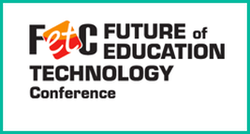
So, circling back to edtech, let’s take a no-box approach. Education may be the only field that doesn’t invite the consumer to be at the table of product development. In a no-box thinking environment, here’s how we approach the challenge…let students design the innovative edtech of the future!
This year, we’re really putting this idea into action by partnering with SMART Technologies® on a brand new Conrad Challenge category, Transforming Education Through Technology. SMART has been an edtech leader for more than 30 years and seen the power of technology to transform learning, so there’s no better partner to collaborate with us on supporting the student perspective and driving new educational innovations that will improve outcomes in the classroom and beyond. (And, by the way, if you’re headed to FETC later this month, you can stop by and chat with our friends from SMART at their booth in the Expo Hall)
Students are considering how we might implement new technologies or improve usage of existing ones to support enhanced educational experiences and better outcomes for future students in the following areas:
- Consider the physical space: How can the learning environment be reimagined and improved to be more effective?
- Curriculum and content: How might we improve learning content to support better student outcomes?
- Thinking about processes: What new processes might we employ to improve learning tool implementations or educational community communications?
- Learning systems and tools for students and teachers: How might content be delivered differently?
This is a process where students can, in a new and exciting way, truly take direct control of their learning. It’s a passion-fueled mission where the title of 'student’ means something more. It indicates that they are entrepreneurial problem-solvers, addressing challenging issues through creativity and critical thinking. When it comes to getting edtech completely right, the industry certainly hasn’t figured it all out yet ― so let’s give our creative students a shot!
Our students are already deep into their edtech innovations, having submitted their initial ideas, and now their business plans, which are being evaluated by subject matter expert and judges from around the globe. Those who advance to the finals will present their pitches to judges at the annual Innovation Summit at the Kennedy Space Center Visitor Complex this April ― it’s like Shark Tank meets the Academy Awards for students!
The finalist teams will vie to become Pete Conrad Scholars and will earn a range of supports to turn their innovations into commercially-viable solutions. Even though we’re still watching enthusiastically as their innovations develop, what kinds of solutions might we expect to see from this process? In a no-box environment, there really is no limit.
I’m extremely excited to discuss important education topics like these in a pair of panel sessions at FETC this January. On Tuesday, January 29 at 10 a.m., I’ll be part of a panel called “Using EdTech to Support Innovation: Unleashing Students’ Entrepreneurial Mindsets” and we’ll discuss the ways in which edtech can be used to help students develop into innovative problem-solvers who will be able to adapt and thrive in an uncertain future. Sound familiar? We’ll talk about the goals for innovation in education and ways educators can support students, and I’m truly looking forward to hearing great ideas from my fellow panelists.
I also have the chance to join the panel for “Supporting and Evaluating Skill Development in the Digital World,” January 29 at 1 p.m. In this session, we’ll think about how schools can identify and respond to each student’s unique abilities and needs, rather than funneling all learners into one narrow pathway to postsecondary success, or sticking with the traditional measures of college- and career-readiness. If you’re interested in some “big picture” thinking about the variety of ways we can help students achieve 21st century success, I hope you’ll join my fellow panelists and I for a great conversation.
Students are creative and brilliant. Through the work I do with the Conrad Challenge, I have the joy of working with so many outstanding young people, and they truly have what it takes to solve some of the most difficult challenges we face. Figuring out education technology is just one part of it, but what they create is sure to be great!
About Nancy Conrad
Nancy Conrad created the Conrad Foundation in 2008 to energize and engage students in science and technology through unique entrepreneurial opportunities. The organization’s flagship program, the Conrad Challenge, is a global competition challenging students to combine education, innovation and entrepreneurship to create products that address real-world challenges and global sustainability.
By enabling young minds to connect education, innovation and entrepreneurship, the Foundation helps provide a bold platform for enriching the innovative workforce of the future. As a leader in transformative education, she has testified before the U.S. House of Representatives Committee on Science, Space and Technology detailing how the Conrad Foundation exemplifies the use of partnership and mentorship to improve STEM education. She has been named one of the top 100 leaders in STEM Education. Follow Nancy C












